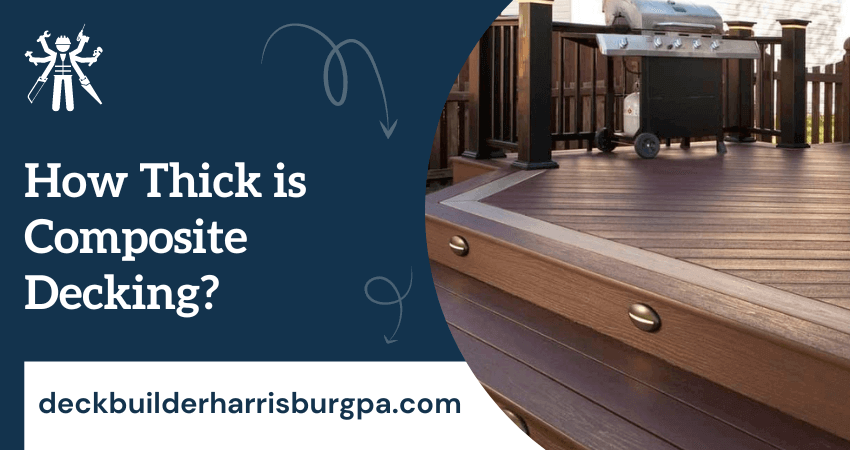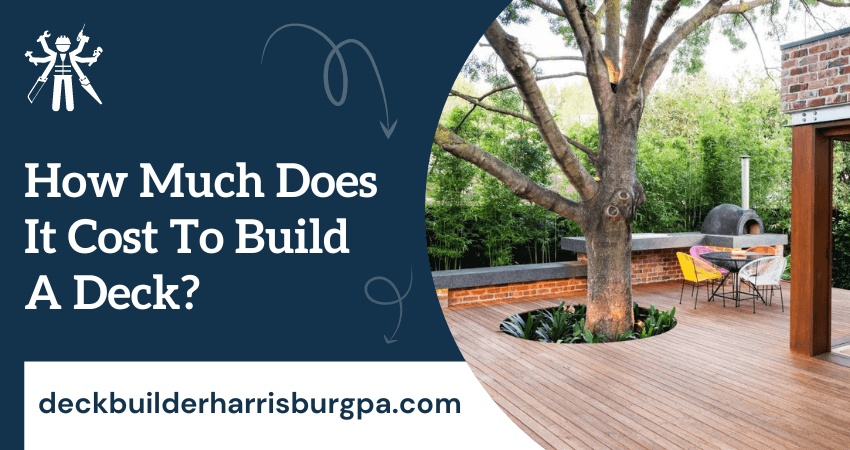Are you considering installing a composite deck on your property? If so, the thickness of your composite deck board is an important consideration. Of all the components that go into building a composite deck, this factor can be one of the biggest decision-makers when constructing your outdoor haven. With various sizes and shapes to choose from, determining which thickness offers the best value for money without sacrificing quality can be tricky.
In this blog post, we’ll take a look at the different composite deck board thicknesses and which thickness is best for different climates. We’ll also provide tips on selecting the right thickness for your outdoor space.
Read on to get all the details about composite deck board thickness!
Composite Deck Board Thickness
Thickness of composite deck boards varies depending on the type. Solid boards are typically between 1 inch and 1.5 inches thick, while grooved or tongue-and-groove style boards may be between 5/4 inch and 1 inch thick. The 5/4” option is the most common.
Thickness of any given board can also depend on the manufacturer and the specific product line. For example, some boards are designed to be thicker than others to provide additional strength, while some may be thinner and more lightweight.
Additionally, other factors such as joist spacing and fastener types used during installation can impact the total deck thickness. Understanding these nuances is important when selecting the right board thickness for your project.
Pros And Cons Of Using Thicker Composite Deck Board
Pros:
- Thicker composite deck boards are stronger and more durable than thinner boards.
- Thicker composite deck boards are less prone to warping, buckling and splitting compared to thinner boards.
- They are less prone to fading and discoloration over time due to the increased thickness of the composite material.
- Thicker deck boards can provide a more aesthetically pleasing look than thin boards because they create a smoother surface with fewer visible gaps or lines between the boards.
Cons:
- Thicker composite deck boards can be more expensive than thinner ones, due to the extra material needed for increased thickness.
- They may require more time and effort when it comes to installation because of their size and weight.
- The thicker composite material used in these boards may make them more susceptible to heat expansion, resulting in potential warping or buckling on hot days.
- Thicker boards may be more difficult to cut and shape than thinner ones.
- The extra weight of thicker deck boards may require additional structural support in order to ensure long-term stability.
How thick should a composite deck board be to ensure its longevity and performance?
A composite deck board should be at least 1” thick to ensure its long-term performance and durability. Thicker boards provide a stronger, more rigid surface that is less prone to warping or bending. Additionally, thicker boards typically have longer warranties than thinner ones, providing peace of mind that your investment will last for years to come. The thickness of a composite deck board will depend on its specific application.
Generally, thicker boards are more durable and offer better performance in higher-traffic areas or where extra strength is needed to support larger items such as hot tubs, gazebos etc.
For residential decks, most composite boards range from 1 inch (25mm) up to 1-1/2 inches (38mm) thick. For commercial applications, 2 inches (50mm) or more boards may be necessary for the deck to stand up to heavy foot traffic and weather conditions.
Which thickness of the composite board is best for different climates and applications?
The best composite board thickness for a particular climate and application will depend on the severity of the conditions. In areas with heavy rainfall, hail or snow, thicker boards are usually recommended to provide additional protection from the elements. For hot climates where extreme heat is present, thicker boards can help keep the deck cooler in direct sunlight.
For residential decks, 1-1/4” to 1-1/2” (32mm to 38mm) is typically sufficient for normal conditions.
For commercial decks, 2 inches (50mm) or more is often recommended for heavier foot traffic and weather resistance.
When in doubt, it’s always best to consult with a decking professional who can provide advice tailored to your project.
Regardless of thickness, all composite deck boards should be installed with adequate fasteners and support to ensure that they remain secure and stable in any environment. Working with a professional installer is often the best way to ensure your deck is built correctly from the start.
How to select the right thickness for your composite deck board?
1. Determine the amount of weight that your deck will have to support
The thickness of your composite deck board should depend on the total load that it will be required to carry or hold. Consider all the weight that would be placed on your deck, including foot traffic and furniture. If you plan to use heavy outdoor furniture like barbecues or hot tubs, you may need a thicker deck board.
2. Check the warranty of your composite decking
Most composite decks come with warranties that will give guidance and restrictions on which thicknesses can be used for specific applications. Make sure to check out what’s covered under the warranty before making any decisions.
3. Consider the climate in which you live
Extreme weather conditions can have an effect on your deck, so consider what types of temperatures and levels of moisture your deck will be exposed to. If you live in an area with hot summers, you may need a thicker board that can withstand more wear and tear.
4. Think about the design
The thickness of your deck board can have an impact on the overall look and feel of your deck. Thicker boards can provide a more traditional look, while thinner boards are great if you’re looking for something a bit more modern.
5. Take into account the cost
Finally, consider your budget when deciding on the thickness of your composite deck board. Thicker boards are typically more expensive, so make sure that you factor in the cost before making a decision.
By taking all of these factors into consideration, you should be able to choose the perfect thickness for your composite deck board.
Final Words
The thickness of composite deck boards can vary depending on the brand and type of material being used. Most composite deck boards range in thickness from 5/4” to 1-1/8”. It is important to make sure that the boards are thick enough to support the weight of the deck, as well as provide sufficient stability and durability.
Additionally, it is important to be aware of the manufacturer’s recommendations for installing composite deck boards, as different types of material may require different installation techniques. It is always best to consult with a professional deck builder for advice on the best option for your deck.




